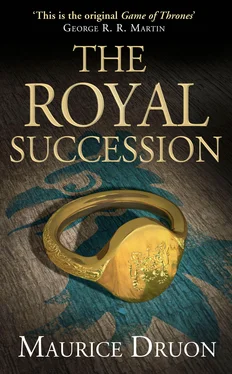‘A little hit at our old enemy,’ thought Poitiers.
‘I have made inquiries,’ Duèze went on, ‘and it appears that the halt, the maimed and the eunuchs who conceal their misfortune beneath a habit, and indeed are beneficed by the Church, are legion. Are we to cast them from our bosom rather than efface their fault, reduce them to penury and perhaps throw them into the arms of the heretics of Toulouse or similar religious confraternities? Let us permit them rather to redeem themselves; and to redeem is to pay.’
The old prelate was perfectly serious. His imagination, stimulated by his meeting with the Abbé Pierre, had created, during these last nights, a complete and precise system on which he intended writing a memorandum to be submitted, so he modestly said, to the next Pope.
It was to create a Holy Office of Penitentiary, which would bring in revenue to the Holy See from bulls of absolution of all kinds. Mutilated priests might obtain absolution at the rate of a few livres for a missing finger, twice as much for a lost eye, and the same for the absence of one or both testicles. A priest who had castrated himself would have to pay a higher price. From bodily infirmities Duèze passed to those of the soul. Bastards who had concealed their condition when receiving orders, priests who had taken the tonsure though married, priests who married secretly after ordination while it was still current, priests who lived unmarried with a woman, priests who were bigamists, or incestuous, or sodomites, would all be taxed proportionately to their sin. Nuns who had wantoned with several men, either within or without their convent, would be subject to particularly costly rehabilitation. 9
‘If the creation of this Penitentiary’, declared Duèze, ‘does not bring in two hundred thousand livres the first year, I’ll be …’
He was going to say ‘I’ll be burnt’, but stopped in time.
‘At least,’ thought Poitiers, ‘if he’s elected, I shall have no need to be concerned for the papal finances.’
But in spite of all Duèze’s manoeuvres, and in spite of the support Poitiers gave him secretly, the Conclave still marked time.
Moreover, the news from Paris was far from good. Gaucher de Châtillon, making common front with the Count of Evreux and Mahaut of Artois, was doing his best to put a brake on Charles of Valois’s ambitions. But Charles was living in the Palace of the Cité, where he had Queen Clémence at his mercy; he was running affairs as he pleased, and sending out to the provinces instructions contrary to those sent by Poitiers from Lyons. Moreover, the Duke of Burgundy had arrived in Paris, on the 16th of June, to establish his rights; he knew that he had the support of the vassals of his huge duchy. France, therefore, had three regents. This situation could not continue for long, and Gaucher asked Philippe to return to Paris.
On the 27th of June, after a restricted council meeting, attended by the Count de Forez and the Count de la Voulte, the young Prince decided to set out as soon as possible, and ordered his escort’s baggage-train to be assembled. At the same time, learning that no solemn mass had yet been held for the repose of his brother’s soul, he ordered masses to be said on the following day, before his departure, in every parish in the town. All the high and low clergy were expected to attend to join their prayers with the Regent’s.
The Cardinals, particularly the Italians, were delighted. Philippe of Poitiers was being compelled to leave Lyons without having made them give way.
‘He is concealing his flight under the pomp of mourning,’ said Caetani, ‘but let him go all the same, that accursed young man. He thought he held us in the hollow of his hand. I assure you that we shall be back in Rome before the month is out.’
5
The Gates of the Conclave
CARDINALS ARE IMPORTANT PEOPLE who must not be mixed with the small fry of the clergy. The Count of Poitiers had ordered that the church of the monastery of the Predicant Friars, called the Church of the Jacobins, 10the most beautiful, the largest, after the Primatial Saint-Jean, and also the best fortified, should be reserved to them for the service to the memory of Louis X. The Cardinals saw in this selection no more than normal respect for their dignity. None was absent from the ceremony.
They numbered but twenty-four and yet the church was full, for each Cardinal was escorted by his whole household – chaplain, secretary, treasurer, clerks, pages, valets, linkmen and trainbearers: nearly six hundred people in all were assembled between the massive white pillars.
Rarely had a funeral mass been followed with so little peaceful meditation. It was the first time for many months that the Cardinals, who had been living in cliques in separate residences, had found themselves all gathered together. Some had not seen each other for nearly two years. They watched each other, quizzed each other, commented on each other’s actions and appearance.
‘Did you see that?’ someone would whisper. ‘Orsini has greeted the younger Frédol. Stefaneschi has been talking for quite a while to Mandagout. Are they rallying to the Provençaux? But Duèze doesn’t look at all well; he’s grown much older.’
And, indeed, Jacques Duèze was making an effort to control his youthful lightness of foot, and walked in with slow step, replying to greetings vaguely, as if he were already detached from this world.
Guccio Baglioni, dressed as a page, formed part of his suite. He was supposed to speak nothing but Italian and to have come straight from Sienna.
‘Perhaps I should have done better,’ thought Guccio, ‘to have put myself under the Count of Poitiers’s protection, for I should certainly have gone back to Paris with him today and I should have been able to make inquiries about Marie, of whom I have had no news for so long. Instead of which, here I am, entirely dependent on this old fox, to whom I have promised my uncle’s money, but who will do nothing for me till the money has arrived. And my uncle does not reply. They say that Paris is in turmoil. Marie, Marie, my beautiful Marie! She’ll think I’ve abandoned her. Perhaps she even hates me now? What have they done with her?’
He imagined her shut up at Cressay by her brothers, or in some convent for Magdalens. ‘Another week like this, and I shall go back to Paris.’
Duèze turned every now and then to look behind him with a curiously alert expression.
‘Are you afraid of something, Monseigneur?’ Guccio asked.
‘No, no, I fear nothing,’ replied the Cardinal, who began secretly observing his neighbours.
The redoubtable Cardinal Caetani, with his thin face divided by a long aquiline nose, and his hair which seemed to shoot out like white flames from the edge of his red skull-cap, made no attempt to conceal his triumph. The catafalque, symbol of Louis X’s death, corresponded in his mind to the waxen doll, pierced with pins, with which he had cast a spell. The glances he exchanged with his following, the Abbé Pierre, Father Bost and the clerk Andrieu, his secretary, were those of victory. He wanted to say to all those present: ‘This, Messeigneurs, is what happens when you attract the vengeance of the Caetani, who were already powerful at the time of Julius Caesar.’
The two brothers Colonna, each heavy chin divided by a vertical cleft, looked like warriors disguised as prelates.
The Count of Poitiers had not economized on the choir. There were a full hundred of them, their voices sounding above the organ, which had four men pumping at its bellows. A royal, reverberating music echoed among the vaults, saturated the air with vibrations, and enveloped the crowd. The junior clerks could gossip among themselves with impunity, and the pages laugh or mock their masters. It was impossible to hear what was being said three paces away, and still less what was taking place at the doors.
Читать дальше












